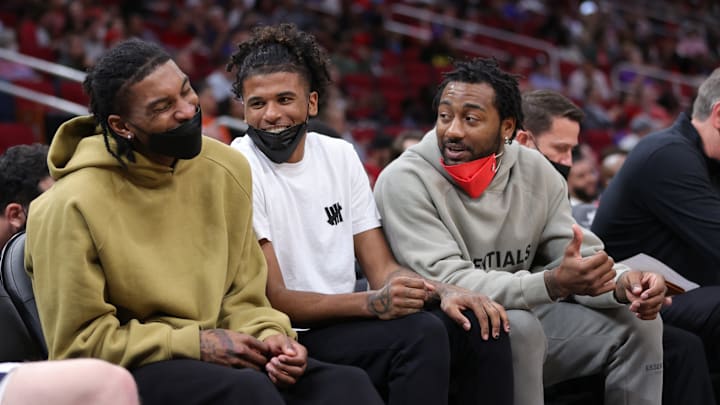During the 2022 NBA Finals, ESPN’s Brian Windhorst drew criticism for anointing the Golden State Warriors' game five victory over the Boston Celtics a “checkbook win.” While the quip sent Warriors fans into a frenzy, he was on to something. The Warriors trotted out the league’s most expensive roster all the way to an NBA championship. If that isn’t a “checkbook win,” I don’t know what is.
“They have a $340 million payroll, you just don’t have to beat the Warriors on the court, you gotta beat their checkbook…this was a checkbook win for the Warriors” pic.twitter.com/3OzI3Jc0pX
— Gifdsports (@gifdsports) June 14, 2022
The NBA’s soft salary cap gives wealthy teams a leg up on the competition. There is a strong correlation between on-court productivity and salary. As this excellent graph from NBA University illustrates, teams are pretty good at paying the right guys.
Value is more crucial than ever in the modern NBA. This helps visualize who is over/under performing their contracts.
— NBA University (@NBA_University) October 15, 2022
Up= Statistically Positive Impact
Down= Statistically Negative Impact
Left= Cheapest Contracts
Right= BIG $$$$
WHAT STANDS OUT? pic.twitter.com/WXJgddLJDg
However, there is a dark side to spending in the NBA, and I’m not here to make fun of Russell Westbrook. Sometimes, a player, no matter their salary, is just not worth keeping on the roster. In these situations, the player and organization negotiate a buyout. The player becomes a free agent, usually taking slightly less than they were guaranteed, and the team takes on a dead cap hit.
Houston Rockets are league leaders
The 2022-23 Houston Rockets are not just the leaders in dead money, they’ve gone to extreme lengths to pay players not to play for them. Entering the season, the Rockets have $52 million in dead cap space. The next closest team, the Oklahoma City Thunder, comes in at a paltry $34 million.
To put that figure into perspective, Stephen Curry will be the highest-paid player next season, and he will only earn $48 million. The Rockets literally have a superstar-sized black hole of dead cap space. So how did they get here?
How the Rockets took their dead cap hits
The greatest driver of the Rockets’ dead cap space is their buyout of John Wall. The Rockets paid Wall $40.8 million to not play for them this season. While that seems exorbitant, it actually saw the Rockets save $6.5 million, and it’s better than having him sit on the sidelines like he did last season.
The next two dead hitters are Maurice Harkless and Ty Jerome. Harkless has a dead cap hit of $4.5 million and Jerome’s is $4.2 million. Those are reasonable amounts for a rebuilding team to absorb, but having an additional $8.7 million could have allowed the Rockets to be more aggressive in free agency or be a middleman in a trade.
The final three are Theo Maledon’s $1.9 million dead cap hit, D.J. Augustin’s $333,333, and Troy Williams’ $122,741. Augustin was bought out last season, and Williams’ is a result of him being waived all the way back in February of 2018 after signing a 3-year, $4.69 million contract in July of 2017.
What does all this dead money mean for the Rockets?
This shouldn’t come as a surprise but racking up dead money is not a great way to rack up wins. Last season, of the top ten teams in dead money, only one, the Memphis Grizzlies, made the playoffs. The group included bottom feeders such as the Pistons, Thunder, Rockets, and Pacers, play-in hopefuls in the Hornets and Spurs, and the three coastal disappointments in the Lakers, Nets, and Knicks.
The Grizzlies were able to overcome their dead money because of their depth of productive players on rookie contracts, something the Rockets of this season share. If the Rockets are going to overcome $52 million in the grave, they’re going to need breakout seasons from multiple players still on their rookie contracts.
The most likely candidates are Jalen Green and Kevin Porter Jr, but Alperen Sengun, Jabari Smith Jr., and Tari Eason have all shown flashes of promise. The good news is that $52 million in dead money means the Rockets will have an incredible amount of cap space to play with in the summer of 2023.
It should be remembered that the Rockets’ league-leading $52 million in dead money still has room to grow. If Eric Gordon and his $19.5 million salary were to be traded, there is a good chance the Rockets would take back some players and salary prime for the chopping block. With a little luck, the Rockets could finish the season with $70 million in dead money.
The Rockets won’t be bragging about any checkbook wins this season, but they could certainly talk about checkbook losses. Money wins in the NBA, and the Rockets lighting $52 million on fire is about as anarchist as the league gets, but all that dead money serves a purpose. It gives roster spots to young developing players and resets the franchise’s financial commitments for the future.
The Rockets and their $52 million in dead money pic.twitter.com/f2aNIDYz30
— N.B. Lindberg (@nblindberg) October 17, 2022
The Rockets may be the kings of dead money this year, but it’s a distinction they’ll likely drop as they push to be more competitive.
